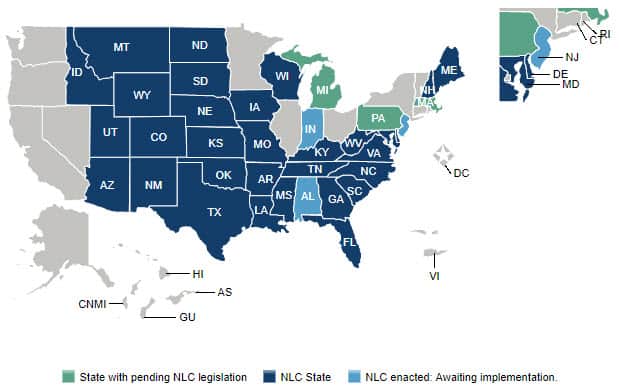Licensure by endorsement, sounds pretty straightforward right? Well, it is the term used when someone has an RN license in one jurisdiction and wants to work in another. Roughly half of U.S. states associate with the nurse licensure compact, which is basically an agreement which enables an RN to be mobile in several states. Finding accurate, up-to-date information regarding this subject can be tedious and frustrating. So we’ve put together pertinent information on how to obtain licensing.
In certain situations, a licensed RN doesn’t need to obtain additional requirements. It all depends on your home state licensing agreements. Some states offer a multi-state license to nurses. It’s best to check with your home state licensing rules for clarity.
Initiation Process
- The first step within the initiation process is to complete your licensing exam. Registered nurses must take this exam called the NCLEX-RN, short for National Council Licensure Examination. This test determines if a candidate is prepared for entry-level nursing practice. The exam is comprised of four main categories and eight subcategories. Questions are formatted predominantly in a four-question multiple choice style. The test can consist of up to 265 questions and you will have a maximum of six hours to complete. Optional breaks are allowed at intervals.
The four major test categories:
- Safe And Effective Care Environment
- Health Promotion and Maintenance
- Psychosocial Integrity
- Physiological Integrity
The NCLEX-RN exam is a pass or fail type of assessment. Conclusions of your test result will be determined by the administrator. Keep in mind, within 2-4 weeks, you will be notified by your State Board of Nursing. As with any test, go into it with confidence, but if you do fail, it’s not the end of your world. Many applicants don’t pass on their first try. You’ll receive a diagnostic report detailing what you need correction in. You’ll be permitted to retake the test after 45 days. If necessary, the second time will be a breeze.
Compact License
- The Nurse Licensure Compact (NLC, for short), which was created by the NCSBN (Nurse Council of State Boards of Nursing) to give nurses the ability to obtain multistate licensing. This compact license allows nurses to provide health care across multistate jurisdictions. They’re able to practice in one state, as well as another and no have to pay additional licensing fees.
- Currently, there are roughly 25 states that participate in NLC.
- Eligibility requires an RN to not have any disciplinary actions taken against them.
- Their primary residence must be one of the participating states.
- Of course, they must be able to meet the educational requirements from their compact state.
- Keep current on licensing fees from all their jurisdictions. Certain states are particular when it comes to up-to-date licensing. It’s best to do an annual check on updates for each state.
- There are some states that offer temporary licenses, they’re often referred to as “walkthrough states”. Some states offer temporary licensure by endorsement for people who are relocating to another state, so they can continue employment. They are temporarily available for 30 days and up to 6 months.
- This is used to fill up positions in another area pretty quickly. These positions get filled up pretty fast since they’re in high demand. Since these are temporary licenses, nurses who are gonna stay longer than a six month period should apply for a permanent license in that particular state. If there are multiple states where you practice, it’s smart to check with a recruiter beforehand.
- They are a few sites that have assignments available for traveling nurses.
Fees and Requirements
- Obtaining licensing for compact states isn’t a difficult task to endure, it just takes some necessary steps. Of course, one of them is fees. The licensing fees range from $100-$400, depending on that particular state.
- If you want a permanent license in various states, then you’ll just have to pay the appropriate fees for each state.
- A criminal background and fingerprinting check is required.
- Continuing education is required for each state you participate in.
- Your proof of identity is required as well. This can be verified through your state driver’s license, passport, and your social security card.
- In some states, references are required as verification of work history.
Hope this article contained enough pertinent and relevant information to steer you in the right direction towards obtaining your compact license. Having your compact license as a nurse can make your life a lot easier. Most recruiters prefer nurses with their compact license because they are verified and have more credibility. This expedites the hiring process, making their job easier and gives you more opportunities. As long as you have a detailed plan and execution, there’s nothing in your way. I’ve found some great nursing opportunities from sites like this. There are a few others but it’s best to go with credible services like Stability




